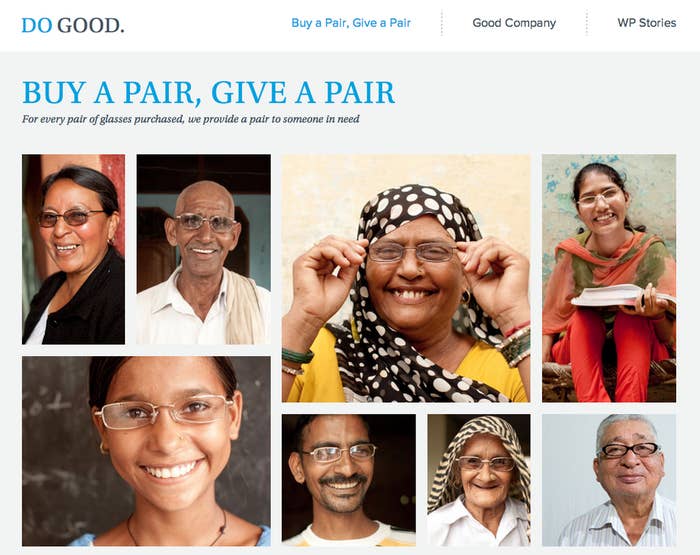
Warby Parker, the rapidly expanding eyewear business, has now sold a million pairs of glasses. That also means it's distributed a million pairs of glasses to individuals who need them in places like India, Bangladesh, and Guatemala, the company said ahead of an announcement Wednesday morning.
The startup, which raised $60 million in venture capital in December for a total of $115 million in funding, has been scaling up quickly since its founding in 2010, opening showrooms and boutiques across the country to sell affordable frames. While the company is generally mum on financials, it said last July that it had given away 500,000 pairs of glasses since its founding, a number that corresponds to those it has sold. It hit this latest milestone less than a year later, suggesting sales are thriving.
Warby's social mission is less in your face than that of, say, Toms shoes, for example. But for each pair of glasses the company sells, it makes a monthly donation to nonprofit partners such as VisionSpring to source an equivalent number of glasses. The partners teach men and women in developing countries how to give basic eye exams and how to sell glasses at an affordable price; those individuals then work to spread awareness and make eye care available in their communities. The goal is to help the estimated 700 million people worldwide who don't have access to glasses in a more sustainable fashion than just handing out free pairs. One pair of glasses, Warby says, can increase an adult's monthly income by 20% and their overall productivity by 35%.
"Distributing stuff for free, while it might be well-intentioned, has unintended consequences ... often it creates a culture of dependence and doesn't solve the problem once and for all," Neil Blumenthal, one of the company's four co-founders, said in a telephone interview. By distributing glasses this way, "there's an economic incentive now for somebody to provide glasses in the long run ... if you're just giving away a bunch of free glasses and leave, what happens when somebody's prescription changes or somebody loses their glasses or breaks their glasses?"
"By selling affordable glasses, you're actually treating people as value-conscious consumers rather than as needy beneficiaries," he explained. "The scale of the problem is so big, with 700 million people around the world not having access to glasses and needing them, it needs to be a sustainable solution."
Warby also pays for employees — it has more than 300 — celebrating their third anniversary at the company to take a group trip to Guatemala that's part vacation and part learning about the work of its nonprofit partners there.
"We don't think the No. 1 reason people buy glasses from us is because of our social mission," he said. "We do think it makes customers more loyal, more likely to tell their friends, but ultimately, I think the biggest benefit is it helps us recruit and retain top talent, because I think people really want to work for companies that have double bottom lines, that are trying to sort of do good and do well."
From VisionSpring's website:

